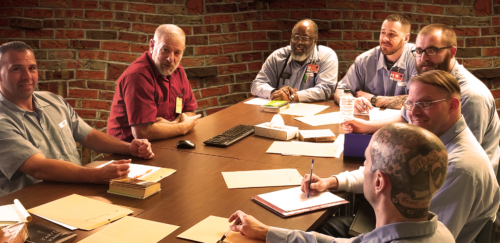
This spring, student inmates at the Idaho State Correctional Institution in Boise studied the Civil War and the trauma of combat. By the end of the six-week class, seven of the eight students enrolled earned a Boise State credit.
Todd Shallat, a Boise State Professor Emeritus of history and urban studies, volunteered to teach the class through a pilot program in the Division of Extended Studies.
“The pilot exceeded our expectations,” said Shallat. “We now have a waiting list of capable students for the fall.”
Shallat is looking for ways to continue and expand the project and grow it into Idaho’s first prison-based post-secondary program. The J.A. and Kathryn Albertson Foundation, known for its support of educational causes, has invited Shallat to apply for a supporting grant.
Why does a program for inmates matter? In Idaho, nearly 40 percent of the inmates released from prison return to prison or probation within the first three years from their release. But a study by Cornell University, home of a decade-old prison education program, found that recidivism fell to just 7 percent for student inmates who completed coursework.
Edits aren’t insults
Shallat’s class was in some ways a throwback to an earlier era, despite the fact that it was online because of COVID-19.
“The students, some of the best I’ve had, are blessed with not having the electronics that freshmen take for granted,” Shallat said.
Students relied on books, classroom discussion, and the writing and rewriting through numerous draft that are hallmarks of any humanities course. Wayne “Kim” Wardwell, coordinator of the prison’s GED program, said that students initially were put off by seeing scores of Shallat’s red editing marks on their papers. They learned to not take edits as insults but to appreciate the attention Shallat paid their writing.
“I use a woodworking analogy for editing,” said Wardwell, who’s taught at the prison for more than eight years. “Say you assemble a nightstand. You sand it. You start with 60 grit paper and work your way down to 400 grit. The wood starts taking on a sheen, almost like glass.”
The prison does not have a research library and inmates cannot use the internet, so their working text was the Pulitzer Prize-winning Civil War novel “The Killer Angels” by Michael Shaara. Students wrote essays in response to the novel.
John Bieter, a professor of history, wrote a letter of support for the program.
“I’m a fan of the work that Todd does as he truly challenges students to think deeply about themselves and our society through the lens of history,” he said.
Coincidentally, one of the students in Shallat’s class is a former student of Bieter’s when Bieter taught at Bishop Kelly High School. Bieter has stayed in contact with the student who has been in prison for more than 20 years.
“We talked about the class and he was especially thankful for the opportunity and hoped there would be more,” said Bieter. “He loved having this type of discussion, something they don’t have much of an opportunity to do.”
A better life
Reducing recidivism and creating a path for former inmates to pursue a college degree were not the pilot’s only aims, said Shallat. Another was improving inmates’ immediate lives.
Taylor Wray, a student in Shallat’s class, had some college credits before entering prison. Now, having completed the class and earned another credit, “I feel like the door’s been opened,” said Wray.
The class “drew me out of my shell,” he said, created a spirit of camaraderie among students and inspired conversations that would not have happened otherwise. Wray conducted the interviews and edited the video that appears at the end of this story.
“I’ve been in prison 11 years,” said Brook Vogt, another student. “The reason I took the class, beyond personal growth, is that I have three daughters that live here in this valley. I want to see inmates better themselves. I would like it if the community were safer for my own children as well as the children of others.”
Generosity all around
The prison project relied on community generosity. Dodds Hayden, owner and CEO of Hayden Beverage in Boise and a board member of the Idaho State Board of Corrections, paid the tuition for the inmates. Wardwell paid for the books and notebooks out of his own pocket. That’s why Shallat, who plans to keep donating his time as an instructor, is looking for broader support. He also credits Rebecca Morgan and Kellie Rose from Boise State’s Division of Extended Studies, who went to the prison to register the students in person.
Shallat is ready to start a new prison class in the fall. Justice 101, an open-access class from Harvard University, concerns moral dilemmas – the morality of murder, the ethics of lying, the virtue of citizenship and the price of a human life.
– Story by Anna Webb
